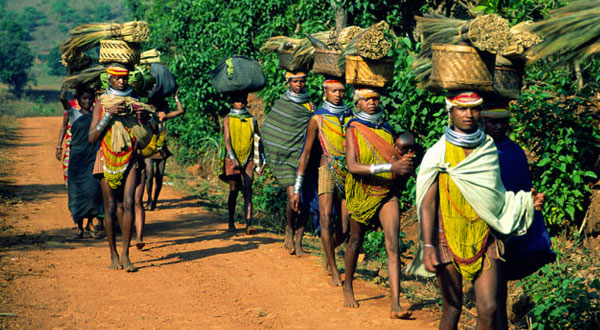Bhala Chandra Shadangi
The Supreme Court recently ordered more than a million tribals and other traditional forest-dwellers to be evicted from forests across 16 states. The last time such country-wide evictions were effected was in 2002-2004 — also triggered by a Supreme Court order — which led to violence, death and protests across forest areas, uprooting about three lakh tribals and non-tribal forest-dwellers.
From across the 16 states, an estimated 1,127,446 applications made by tribal and other forest-dwelling community households claiming FRA rights have been rejected. According to the petitioners, some so-called wildlife groups challenging the validity of Forest Rights Act (FRA), about 20.5 lakh claims were rejected from among 44 lakh made across states. Madhya Pradesh has the highest number of rejected claims (3.5 lakh), followed by Odisha (nearly 1.5 lakh). Goa, Gujarat and Himachal Pradesh are yet to adjudicate on claims and have been directed to complete the exercise by the next hearing. Numbers from these states will increase the number of rejected applications to several million. The order will uproot millions of tribals and other traditional forest-dwellers from their land and livelihood and cause them unprecedented hardship.
Gujarat told applicants to submit, with evidence including satellite images of the land to which they were staking claim. While most tribals do not have two pennies to rub together, the government wants them to get satellite images
The court order is a major blow to the struggle of tribals and other traditional forest-dwellers. Fact is that the Narendra Modi-led Union government has been trying to weaken FRA, as it is a hindrance to the interests of corporate masters. That is why government lawyers deliberately failed to appear in court February 13 to defend FRA before the Supreme Court.
The rejected claims in some states need to be reviewed. In many states there have been reports that the administrations have been going particularly slow on even accepting community-level claims. The rejections in many cases are faulty and need review under new regulations of the tribal affairs ministry. Also, rejection does not always mean the applicant’s case lacks merit. For most forest-dwelling communities, applying for an abstract notion such as rights is daunting.
States are wary of allowing forest rights to tribals, as this could, among other things, complicate their ability to divert forest land for industry and mining. States have devised strategies to reject FRA claims to serve corporate interests.
States such as Jharkhand and Himachal Pradesh have refused to accept applications by other traditional forest-dwellers. Gujarat told applicants to submit, with evidence including satellite images of the land to which they were staking claim. While most tribals do not have two pennies to rub together, the government wants them to get satellite images.
Earlier this year, many tribal organisations had grown anxious about the security of FRA. In a joint letter earlier this month, they appealed to Union Tribal Affairs Minister Jual Oram for getting the Centre’s counsel to defend the law. Therefore, a case against the constitutional validity of the Forest Rights Act has turned into one seeking the eviction of forest-dwellers. This is a huge setback in terms of the interpretation of the Act.
In the past, too, various official and independent reports have confirmed that large number of FRA claims was wrongly rejected and forest officials, in particular, have a track record of preventing people’s rights from being recognised. State and central governments, too, have repeatedly recognised this in their reports. But Centre chose to not inform the Supreme Court of this basic fact.
There were at least three grounds on which the ministry could have challenged the petitioners’ demand that forest claims be rejected and residents evicted.
First, FRA says no one should be evicted while the process of recording their rights was under way.
Second, the Act contains no clause for eviction of rejected claimants. In fact, section 4(5) specifically prohibits eviction until the process of implementation is fully complete in an area. The government has to inform applicants why their claims have been rejected so that they can appeal against the decision. Subsequently, evictions have to be carried out under the process defined by India’s forest laws. The government has to first serve them a notice and then they can appeal. It cannot just evict a million tribals.
Third, the process of recognising rights has been poorly implemented. Of the 41 lakh claims filed so far, only 18 lakh have been approved; 3 lakh are being processed and the remaining 20 lakh have been rejected. But on all three fronts, the ministry’s lawyers remained silent.
The Supreme court order can become a pretext for forest officials to attack millions of forest-dwellers across the country, who are already facing inhuman eviction from their land. The order has short-circuited the process laid down in the Act for those whose appeals have been rejected.
Already, lakhs of acres of forest land have been diverted for non forestry activities such as mining and setting up industries without settling forest rights of locals. Even Green Tribunals have cleared these diversions arbitrarily.
FRA was enacted to remedy historical injustice committed by the British and the governments post 1947, who seized forest land without respecting people’s rights. Two-third of the country’s forests are in areas that constitutionally belong to tribals under the Fifth Schedule of the Constitution. The government has to hand back forest land to tribals and other traditional forest-dwellers according to criteria laid down. The Act, since its inception in 2006, has seen opposition from within ranks of forest officials and some wildlife groups and naturalists. This, combined with the fact that at the ground level it is the forest bureaucracy that has to administer law, has made the implementation difficult and tardy.
There is an urgent need to halt any eviction of forest-dwellers and tribals; the central government should appeal for a review and, if required, bring an ordinance.
The writer is a columnist on socio-economic issues. e-Mail: bhalachandra.odisha@gmail.com






































